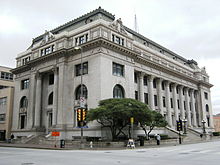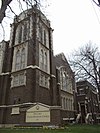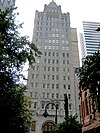Charles D. Hill
Charles Dexter Hill | |
|---|---|
| Born | October 23, 1873 |
| Died | January 2, 1926 (aged 52) |
| Nationality | American |
| Occupation | Architect |
| Buildings | Dallas Municipal Building; Galveston City Hall; Republic National Bank Building; Buildings for Southern Methodist University |

Charles D. Hill (October 23, 1873 – January 1, 1926) was an American architect practicing in Dallas, Texas during the first three decades of the twentieth century.
Life and career
[edit]Charles Dexter Hill was born October 23, 1873, in Edwardsville, Illinois. He attended Valparaiso University from 1894 to 1895 before returning to Edwardsville. He worked as a draftsman for architects Charles Pauly of Edwardsville and Frederick C. Bonsack FAIA of St. Louis. For a few years he also operated a small practice of his own in Edwardsville,[1] and briefly formed a partnership with Theodore C. Kistner in Granite City. Hill came to Texas in 1903, joining the office of Sanguinet & Staats in Fort Worth.[2] In 1905 he was sent to Dallas to manage a new branch office. He became a partner in 1906, with the Dallas office now known as Sanguinet, Staats & Hill. In 1907 Hill bought the Dallas office outright, renaming it C. D. Hill & Company.[2] The new firm quickly gained a statewide reputation, and a second office in Houston was established in 1908. In 1914 a third was added at Galveston, under the management of H. F. Davis,[3] though this appears to have been discontinued after a few years.
His partners in C. D. Hill & Company were Douglas F. Coburn and Herschell D. Smith. The partnership was active until Hill's death in early 1926, when it was succeeded by Coburn, Smith & Evans (1926–1927), Coburn & Smith (1927–1928), Coburn & Fowler (1928 – c. 1931) and D. F. Coburn. The firm operated under Douglas F. Coburn until 1939, when he relocated to Shreveport, Louisiana, where he worked with the noted firm of Edward F. Neild until his retirement in 1955.[4]
Personal life
[edit]Hill joined the American Institute of Architects in 1917.[1]
Hill was married twice and had three children. He died January 2, 1926, in Dallas at the age of 52.[1]
Legacy
[edit]Most of Hill's larger works are neoclassical buildings reflecting the Beaux-Arts movement. He also worked in other popular revival styles, including Colonial Revival and Gothic Revival, usually for residences and churches, respectively. Other projects, including the city halls of Galveston and Woodward, Oklahoma exhibit elements of Renaissance Revival architecture.
At least ten buildings designed by Hill and his partners have been listed on the United States National Register of Historic Places, and others contribute to listed historic districts..
The noted architect Joseph Finger was an employee in the firm's Houston office from 1908 to 1913.
Architectural works
[edit]| Year | Building | Address | City | State | Notes | Image | Reference |
|---|---|---|---|---|---|---|---|
| 1908 | House for Charles D. Hill | 4938 Junius St | Dallas | Texas | The architect's first Dallas area home. A contributing property to the Munger Place Historic District, listed on the National Register of Historic Places in 1978.[5] | [6] | |
| 1908 | House for Edward O. Tenison | 3001 Turtle Creek Blvd | Dallas | Texas | Demolished in 1947. | [7] | |
| 1909 | Coliseum (former), Fair Park |
3921 Martin Luther King Jr Blvd | Dallas | Texas | Renovated in the Art Deco style in 1936 to serve as the Hall of Administration for the Texas Centennial Exposition. Most recently used as the Women's Museum. | [8] | |
| 1909 | Hillsboro City Hall (former) | 3127 E Franklin St | Hillsboro | Texas |  |
[9] | |
| 1909 | House for Collett H. Munger | 5400 Swiss Ave | Dallas | Texas | A contributing property to the Swiss Avenue Historic District, listed on the National Register of Historic Places in 1974.[10] | [11] | |
| 1909 | South Texas National Bank Building | 215 Main St | Houston | Texas | Listed on the National Register of Historic Places in 1978, but was demolished in 1983. |  |
[12] |
| 1910 | Bender Hotel | 911 Walker St | Houston | Texas | Demolished in 2005. |  |
[13] |
| 1910 | House for George W. Bottoms | 500 Hickory St | Texarkana | Arkansas | In association with Witt & Seibert of Texarkana. Listed on the National Register of Historic Places in 1982. |  |
[14] |
| 1910 | House for Edgar Flippen | 4800 Preston Road | Dallas | Texas | This home is Hill's first Highland Park commission.[15] | [16] | |
| 1911 | First Presbyterian Church of Dallas | 1835 Young St | Dallas | Texas | A contributing property to the Dallas Downtown Historic District, listed on the National Register of Historic Places in 2006.[17] | [18] | |
| 1911 | Nueces Hotel | 601 N Water St | Corpus Christi | Texas | Demolished in 1970. | [19] | |
| 1911 | Oak Lawn Methodist Church | 3014 Oak Lawn Ave | Dallas | Texas | Listed on the National Register of Historic Places in 1988. |  |
[20] |
| 1912 | House for Henry Lee Edwards | 4500 Preston Road | Dallas | Texas | The home was designed for Henry Lee Edwards who co-founded the Dallas Country Club. It later sold in 1961 to real estate developer Trammell Crow and remained in the family before selling to Andy Beal who demolished the home in 2017.[21] | [15] | |
| 1912 | Dallas Municipal Building | 106 S Harwood St | Dallas | Texas | In association with Mauran, Russell & Crowell of St. Louis as consulting architects.[22] A contributing property to the Dallas Downtown Historic District, listed on the National Register of Historic Places in 2006.[17] |  |
[23] |
| 1912 | House for E. C. McCartney | 603 W Marvin Ave | Waxahachie | Texas | Listed on the National Register of Historic Places in 1986. |  |
[24] |
| 1913 | Sherman Hall, Austin College |
900 N Grand Ave | Sherman | Texas |  |
[25] | |
| 1913 | Thompson Hall, Austin College |
900 N Grand Ave | Sherman | Texas | [25] | ||
| 1914 | Trinity Presbyterian Church | 104 E 10th St | Dallas | Texas | Demolished. | [26] | |
| 1916 | Central Presbyterian Church | 402 N College St | Waxahachie | Texas | Listed on the National Register of Historic Places in 1987. |  |
[27] |
| 1916 | City Temple of the Central Presbyterian Church | Patterson and N Akard Sts | Dallas | Texas | Demolished in 1963.[7] | [28] | |
| 1916 | East Dallas Presbyterian Church | 2240 Swiss Ave | Dallas | Texas | Demolished. | [29] | |
| 1916 | Galveston City Hall | 823 Rosenberg St | Galveston | Texas | Listed on the National Register of Historic Places in 1984.[30] |  |
[31] |
| 1917 | Woodward City Hall | 1219 8th St | Woodward | Oklahoma | [32] | ||
| 1920 | First Presbyterian Church of Ferris | 205 N Church St | Ferris | Texas | [33] | ||
| 1921 | Blackstone Hotel | N Broadway Ave and E Locust St | Tyler | Texas | Demolished in 1985. | [34] | |
| 1921 | First Baptist Church of Houston | 1010 Lamar St | Houston | Texas | Demolished. | [35] | |
| 1921 | Palace Theatre | 1625 Elm St | Dallas | Texas | Demolished. | [7] | |
| 1921 | Y. W. C. A. Building | 206 N Haskell Ave | Dallas | Texas | Demolished in 2007. | [36] | |
| 1923 | Melrose Court | 3015 Oak Lawn Ave | Dallas | Texas |  |
[37] | |
| 1923 | Republic National Bank Building | 1309 Main St | Dallas | Texas | Now known as the Drakestone, and formerly the Davis Building, under which name it was listed on the National Register of Historic Places in 2006. |  |
[38] |
| 1924 | House for Charles D. Hill | 3318 Beverly Dr | Highland Park | Texas | The architect's second Dallas area home. | [23] | |
| 1924 | House for Fred Schoelkopf | 3905 Beverly Drive | Dallas | Texas | The home was later sold to businessman Sam Wyly. In 2017 The home was sold once more, at this point the home underwent a major renovation which was completed in 2021. The renovation maintained the original CD Hill design. | [39] | |
| 1925 | Hyer Hall, Southern Methodist University |
6425 Boaz Ln | University Park | Texas | Listed on the National Register of Historic Places in 1980.[40] |  |
[41] |
| 1925 | Warwick Hotel | 5701 S Main St | Houston | Texas | Now known as the Hotel ZaZa. | ||
| 1926 | State National Bank Building | 101 N Beaton St | Corsicana | Texas | In association with Harry O. Blanding of Corsicana. A contributing property to the Corsicana Commercial Historic District, listed on the National Register of Historic Places in 1995.[42] |  |
[23] |
| 1927 | Dallas National Bank Building | 1530 Main St | Dallas | Texas | Credited to Coburn, Smith & Evans. Listed on the National Register of Historic Places in 2005.[42] |  |
[43] |
| 1928 | Stanley Patterson Hall, Southern Methodist University |
6425 Boaz Ln | University Park | Texas | Credited to Coburn & Smith. Listed on the National Register of Historic Places in 1980.[44] |  |
[44] |
References
[edit]- ^ a b c "Charles D. Hill," aiahistoricaldirectory.atlassian.net, AIA Historical Directory of American Architects, n. d. Accessed May 19, 2021.
- ^ a b Cheryl Caldwell Ferguson, Highland Park and River Oaks: The Origins of Garden Suburban Community Planning in Texas (Austin, TX: University of Texas Press, 2014)
- ^ "Personal," American Contractor 35, no. 31 (August 1, 1914): 121.
- ^ "D. F. Coburn Succumbs to Illness Here," Shreveport Times, February 7, 1958, 5.
- ^ Munger Place Historic District NRHP Registration Form (1978)
- ^ Valve World (October 1908): 276.
- ^ a b c Mark Doty, Lost Dallas (Charleston: Arcadia Publishing, 2012)
- ^ Western Contractor (August 18, 1909): 9.
- ^ "Contracts Let," Bricklayer and Mason 12, no. 8 (August 1909): 194.
- ^ Swiss Avenue Historic District NRHP Registration Form (1974)
- ^ Manufacturers' Record (February 11, 1909): 66.
- ^ Manufacturers' Record (March 18, 1909): 62.
- ^ Engineering Record (February 12, 1910): 46c.
- ^ Bottoms House NRHP Registration Form (1982)
- ^ a b "Preservationists decry razing of 105-year-old Highland Park mansion, once Trammell Crow's". The Dallas Morning News. January 18, 2023. Retrieved April 25, 2023.
- ^ Newby, Douglas. "Charles D. Hill Designed Architecturally Significant Mount Vernon Residence". Architecturally Significant Homes. Retrieved April 25, 2023.
- ^ a b Dallas Downtown Historic District NRHP Registration Form (2006)
- ^ "City of Dallas, Texas - Designated Landmark Structures". Archived from the original on 10 May 2012. Retrieved December 17, 2021.
- ^ Engineering Record (June 17, 1911): 74.
- ^ Oak Lawn United Methodist Church NRHP Registration Form (1988)
- ^ "Historic 105-Year-Old 'Trammell Crow Estate' In Dallas, TX Demolished". PricyPads.com. Retrieved April 25, 2023.
- ^ Tradesman (January 9, 1913): 57.
- ^ a b c Jay C. Henry, Architecture in Texas: 1895–1945 (Austin, TX: University of Texas Press, 1993)
- ^ McCartney House NRHP Registration Form (1986)
- ^ a b Western Contractor (July 23, 1913): 19.
- ^ Texas Trade Review and Industrial Record (January 1, 1915): 21.
- ^ Central Presbyterian Church NRHP Registration Form (1987)
- ^ Texas Trade Review and Industrial Record (July 15, 1916): 14.
- ^ Texas Trade Review and Industrial Record (January 15, 1917): 14.
- ^ City Hall NRHP Registration Form (1984)
- ^ Texas Trade Review and Industrial Record (March 15, 1916): 12.
- ^ Texas Trade Review and Industrial Record (February 1, 1917): 14.
- ^ Texas Trade Review and Industrial Record (March 15, 1920): 28.
- ^ American Architect (May 25, 1921): 18.
- ^ Engineering News-record (July 28, 1921): 52.
- ^ Engineering News-record (August 25, 1921): 99.
- ^ "Contract for $2,250,000 Apartments at Dallas," Manufacturers' Record (December 13, 1923): 89.
- ^ Manufacturers' Record (October 4, 1923): 58.
- ^ Brown, Steve (13 November 2017). "Bankrupt Dallas billionaire Sam Wyly's Highland Park mansion is sold". The Dallas Morning News. Retrieved 25 April 2023.
- ^ Hyer Hall NRHP Registration Form (1980)
- ^ Engineering News-record (February 26, 1925): 111.
- ^ a b Corsicana Commercial Historic District NRHP Registration Form (1995)
- ^ Dallas National Bank Building NRHP Registration Form (2005)
- ^ a b Stanley Patterson Hall NRHP Registration Form (1980)
